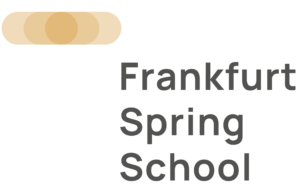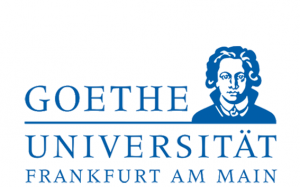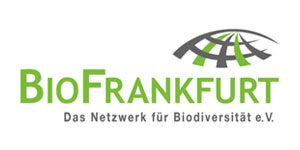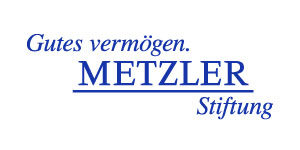Frankfurt Zoological Society (FZS) is an international conservation organisation based in Frankfurt, Germany. Founded by citizens of Frankfurt to initially establish and run the Frankfurt Zoo in 1858, FZS was re-established by Bernhard Grzimek in the 1950ies as a conservation organisation. FZS is committed to preserve wildlands and biological diversity in the last remaining wilderness areas on the planet and focuses on large, biodiversity-rich areas in east Africa, in central South America and south-east Asia, and also in central and eastern Europe.
FZS is proud to be one of the initiators of the Frankfurt Spring School and to contribute to the education of our future conservation project managers – because “Education is the most powerful weapon you can use to change the world” (Nelson Mandela).
Goethe University of Frankfurt (GU) is a large university in the heart of Europe offering undergraduate and advanced degrees in all traditional faculties. Students who study biology or ecology at the GU, receive theoretical knowledge of biodiversity, ecology, evolution, and nature conservation and practical training in the field as well as in laboratories.
However, to successfully implement projects in nature conservation, the students need also skills in project development and management, human resources, and intercultural competences, among further soft skills. By participating in the Frankfurt Spring School on Conservation Project Management, the students learn these skills from international trainers. Goethe University is one of the key player of the Frankfurt Spring School and most of the lectures take place at the Riedberg Campus.
KfW Foundation engages directly with the major challenges our world is facing– globalisation, environmental protection, climate and demographic change.
KfW Foundation funds Frankfurt Spring School scholarships for six dedicated employees from national park authorities or park managers from Latin America, Africa and Asia. The scholars participate in the programme and additionally, they develop a proposal for funding a conservation project in their park or authority. The finalised project proposals are assessed by a jury at the end of the course. Up to three conservation projects receive financial support to implement their goals.
KfW Development Bank has been helping the German Federal Government to achieve its goals in development policy and international development cooperation for more than 50 years. It is both an experienced bank and a development institution with many years of national and international financing expertise and profound knowledge of development policy.
KfW Development Bank also supports future talents. During the Frankfurt Spring School on Conservation Project Management, project managers from KfW Development Bank provide an introduction to financial development cooperation and funding activities related to protecting and using natural resources.
KPMG is one of the leading auditing and consulting companies not only in Germany but also worldwide. KPMG not only bears responsibility for their customers and the long-term assurance of their economic success, but has also an entrepreneurial and social responsibility for their employees and the society.
KPMG employees volunteer as lecturers during the Frankfurt Spring School and contribute their know-how in the areas of financing, accounting or human resources.
WWF Germany aims at stopping the degradation of the planet’s natural environment and to build a future in which people live in harmony with nature. We do so by conserving the world’s biological diversity, ensuring that the use of renewable natural resources is sustainable and promoting the reduction of pollution and wasteful consumption. This is well possible and numerous conservation projects by a multitude of organizations around the world provide ample proof every day. The key to success is professional Conservation Project Management – jointly with people and for people.
WWF considers it a special privilege to be a partner of the Spring School and to contribute to the professional education and training of future managers of conservation respectively environmental protection projects.
The BioFrankfurt network was founded in 2004. Currently, it comprises 12 member institutions as well as additional associated partners. All work together in the field of biological diversity, education, conservation and development cooperation. The goal is to develop innovative strategies that help preserve the natural wealth of our planet.
BioFrankfurt wants to share their knowledge, as a joint effort is essential to preserve biodiversity successfully in the long run. Our future viability does not only depend on a sustainable economic development but also on the possibility to continuously resort to and learn from biodiversity. One of the very successful outcomes of the BioFrankfurt network is the Frankfurt Spring School on Conservation Project Management which was initiated by BioFrankfurt members such as FZS, Goethe University and WWF.
Founded in 1987, and building upon a strong foundation of science, partnership and field demonstration, Conservation International empowers societies to responsibly and sustainably care for nature, the world’s global biodiversity, for the well-being of humanity. It brings together more than 900 employees and 1,000 partners in more than 30 global offices.
Conservation International is proud and honored to participate in the Frankfurt Spring School, where future conservation leaders have a chance to further their knowledge and enhance their global network. Conservation International’s participation in the Frankfurt Spring School is part of our global ambition to educate and support future conservation managers.
Donors
The Metzler-Foundation´s purpose is to support besides others science and research, education, development aid as well as the protection of the environment and endangered species. The foundation’s philosophy is to help people to develop their potential so that they can support themselves and others: the key to this is education.
Funding the Frankfurt Spring School since 2017 perfectly combines most of the Foundation’s purposes.






